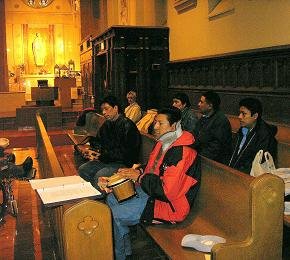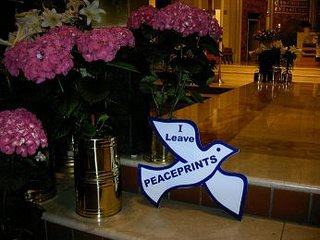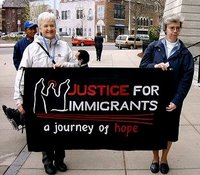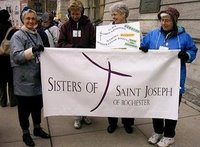Migrant workers can be cursed, insulted, but they cannot be bid "good riddance". A new population of foreign-born workers in America is affording us more blessings than we can readily identify and while there are problems with immigration, most can be adjusted; some can be solved, but all must be
endured. The immigration system we have now in this country is broken. Current laws undermine human dignity and family life. The immigration reform that has come out of the U.S. House of Representatives was
flawed, and the reconsideration of the reform toward a more favorable bill for human rights has come from the Senate (*
Kennedy-McCain). The Bishop said that the Catholic social teachings and experience as an "immigrant church" (
with 71% of new parishioners being foreign-born) play a large part in shaping policy.
Bishop Costello reminded those present of the spiritual directives in the Bible that call upon the faithful to speak out about the issue of immigration. In Deuteronomy, the chosen ones were enslaved in Egypt and God (
my comment: in a decidedly political act) God helped them to escape their enslavement. Deuteronomy 27:19 states, "Cursed is he who distorts the justice due an alien, orphan, and widow."
Exodus 12:49 says, "The same law applies to the native-born and to the alien living among you." Exodus 23:21 says, "Do not mistreat an alien or oppress him, for you were aliens in Egypt." The Bishop said that, from our spiritual heritage alone, we should know how alienation feels. Let alien, orphan, and widow find sustenance. Love them.
In the New Testament Gospel of Matthew, Jesus' teachings are clear. He calls upon us to "welcome the stranger." (Mt. 25:31-46) In the parable of the Good Samaritan, He blatantly tells us to embrace the stranger no matter how different he or she may be from us. St. Paul advocated hospitality to the stranger when he reminded us to entertain angels. Hebrew 13:2: "Be not forgetful to entertain strangers: for thereby some have entertained angels unawares." We are all one family of God.
In 1891 Pope Leo XIII recognized the right of all people to move freely from nation to nation. Prompted by the refuge crisis after WWII in 1952, Pope Pius XII committed us to caring for the pilgrim, alien, exile, and immigrant alike. (Encyclical Letter Exsul Familia). Pope John XXIII recognized that refugees cannot lose their human rights simply because they are deprived of citizenship of their own states. When there are just reasons in favor of it, he must be permitted to emigrate to other countries and to take up residence there. The fact that he is a citizen of a particular state does not deprive him of membership in the human family, nor the citizenship in that universal society, the common, world-wide fellowship of men. The human rights of every single person demand respect regardless of their legal status. (Pacem in Terris, 1963)
There are economic ramifications surrounding the politicization of immigration reform. There will always be poverty and greed in play. Fear is real since 9/11. When all is said and done, we see that U.S. popular opinion and governmental policy is unfriendly to "the stranger." The INS is probably the least "user-friendly" part of the governmental bureaucracy. There is a sense of apathy about the issue because it is so complicated and confusing. The Bishop assures us there are things we can do to support immigration reform that takes into consideration the dignity of every human being, regardless of their native land.
1. Prayer.
2. Education - becoming self-aware and teaching others.
3. Advocacy





